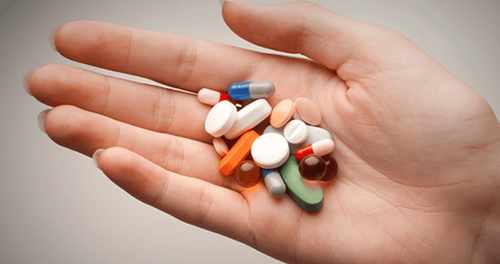This is an automatically translated article.
Quinolone antibiotics are very widely used today to treat bacterial infections. Among them, Moxifloxacin is the most commonly used active ingredient with the trade name Avelox. So what disease does Avelox treat?
1. What disease does Avelox treat?
Moxifloxacin - the main active ingredient of Avelox - is an antibiotic used to treat a variety of bacterial infections. Avelox belongs to the quinolone class, which works by stopping the growth of bacteria.
Accordingly, the antibiotic Avelox is only used to treat bacterial infections, so it will not be effective for viral infections (such as the common cold, viral flu). Unnecessary use of any antibiotic, including Avelox, can make it ineffective for future infections (antibiotic resistance).

Thuốc Avelox có tác dụng hiệu quả trong điều trị nhiễm trùng do vi khuẩn
2. Instructions for using Avelox
Carefully read the medication instructions provided by the pharmacist before starting to use moxifloxacin, if you have any questions, ask your doctor or pharmacist for advice. Avelox tablets are to be taken by mouth, with or without food. It should be taken as directed by your doctor, usually once a day. Dosage and duration of treatment with Avelox is based on the health status and response of each patient.Take Avelox at least 4 hours before or 8 hours after taking products that have the potential to bind to the drug, reducing its effectiveness such as: quinapril, sucralfate, vitamins and minerals (including iron supplements). and zinc), products containing magnesium, aluminum, or calcium (such as antacids, didanosine solutions, calcium supplements). To get the best treatment effect, patients should take antibiotics at evenly spaced times, at the same time(s) each day for easy remembering. Keep taking this medicine until the prescribed amount is gone, even if symptoms disappear after a few days of taking it, stopping it too soon can cause the infection to return.
3. Avelox side effects
Avelox can cause side effects such as:
Nausea; Diarrhea; Dizziness, lightheadedness; Headache; Fatigue, body weakness; Difficulty sleeping. If undesirable effects occur and cause discomfort to the patient, immediately notify the doctor for appropriate treatment.
Some serious side effects require immediate medical attention, including:
Unusual bruising or bleeding; New infection occurs (such as fever or persistent sore throat); Signs of kidney disease; signs of liver disease (such as unusual tiredness, stomach or abdominal pain, nausea, persistent vomiting, yellow eyes, jaundice, dark urine); Severe dizziness; Sudden fainting; irregular heartbeat: fast or irregular; Dissection causes rupture of the aorta (presents with abdominal pain, sudden, severe chest pain, recurrent cough or shortness of breath). Moxifloxacin can cause intestinal infections caused by the bacteria C.difficile . This condition may occur during treatment or weeks to months after stopping Avelox.
Recognize the signs of intestinal infection and contact a doctor such as: persistent diarrhea, abdominal pain, cramps, stools with blood or mucus. If this side effect is suspected, the patient absolutely should not use antidiarrheal drugs or opioid derivatives because they can make the infection worse.
Prolonged or repeated use of Avelox may lead to oral thrush or fungal diseases. Contact your doctor if patient develops white patches in the mouth area, changes in vaginal discharge, or other unusual symptoms that are suspected of being caused by a yeast infection.

Người bệnh bị chóng mặt dữ dội sau khi sử dụng thuốc cần đến gặp bác sĩ
4. Notes when using the drug Avelox
Before taking Avelox, the patient should inform the doctor about the previous history such as:
Allergy to moxifloxacin or other quinolone antibiotics (such as ciprofloxacin, levofloxacin); Other medical conditions or allergic conditions; Diabetes ; Cardiovascular diseases (such as recent myocardial infarction); Musculoskeletal problems (such as tendinitis, bursitis); Liver disease; Mental illness (such as depression); Myasthenia gravis ; Nerve problems (such as peripheral neuropathy); Convulsions or risk factors for convulsions (such as traumatic brain injury, head trauma, brain tumor, cerebral atherosclerosis); Vascular diseases (such as aneurysms or blockages of the aorta and other blood vessels, hardening of the arteries); Hypertension; Certain genetic disorders (such as Marfan syndrome, Ehlers-Danlos syndrome). Moxifloxacin when used can affect the heart rate (prolonged QT). This problem can cause arrhythmias (such as severe fast or irregular heartbeat) and other symptoms (such as severe dizziness, fainting).
The risk of QT prolongation with Avelox is increased if the patient has certain medical conditions or is taking other drugs that can prolong QT. Before using Avelox, patients should inform their doctor or pharmacist of all medications they are taking and any problems with heart disease (heart failure, bradycardia, QT prolongation in the electrocardiogram). ), a family history of certain heart problems (such as sudden cardiac death).
Low blood potassium or magnesium is a risk factor for QT prolongation. Especially patients who use diuretics or have symptoms of dehydration such as excessive sweating, diarrhea or vomiting.
Avelox can affect the blood sugar of patients, especially for people with diabetes. Therefore, patients need to monitor their blood sugar regularly as directed and share the results with their doctor. Be aware of the signs of hyperglycemia, such as increased thirst, increased urination, or low blood sugar such as sudden sweating, tremors, rapid heartbeat, hunger pangs, blurred vision, sudden dizziness, or feeling dizzy. tingling in hands and feet.
Diabetics should carry a backup of sugar supplements to manage sudden hypoglycemia. When hypoglycemia is suspected, the patient should quickly add foods containing fast-absorbing sugars such as table sugar, honey, candy, fruit juice or canned soft drinks.
Talk to your doctor if you have any unusual reactions while using Avelox. To prevent sudden low blood sugar, the patient should eat regular meals and do not skip meals. However, some patients need to be switched to a different antibiotic or adjusted by their doctor when there are problems related to blood sugar fluctuations.

Rối loạn nhịp tim có thể xảy ra do tác dụng phụ của thuốc Avelox
Children may be more sensitive to the side effects of Avelox, especially tendon problems. Older adults are at higher risk for tendon problems (especially when they are being treated with corticosteroids such as prednisone or hydrocortisone), QT prolongation, and sudden rupture of major blood vessels. During pregnancy, Avelox should be used only when clearly needed. The ability of Avelox to pass into breast milk has not been confirmed, so consult your doctor before breast-feeding.
5. Drug Interactions of Moxifloxacin
An interaction is a factor that changes the effect of a drug or increases the risk of serious side effects. Products that may interact with Avelox include: anticoagulants (acenocoumarol, warfarin), Strontium...
Some other drugs can affect heart rhythm (QT prolongation) and should be limited. used with Avelox drugs, including
Amiodarone; Dofetilide; Procainamide; Quinidine; Sotalol; Ziprasidone. Avelox is only used to treat an existing bacterial infection, so do not use this product to prevent other infections unless your doctor tells you to. Tests such as liver function, complete blood count, blood sugar... should be performed periodically to monitor disease progression or check for side effects. If the patient misses a dose, take it as soon as you remember if it is at least 8 hours before the next dose. If it is less than 8 hours until the next dose, skip the missed dose, do not double the dose to make up.
To ensure safety and monitor disease status after using the drug, patients should perform periodic health check-ups. At Vinmec International General Hospital, there are now a full range of tests and clinical examinations to check the patient's health status, monitor the time after using the drug of the patient. The entire examination and testing process at Vinmec is carried out by a team of experienced and qualified medical doctors and modern medical facilities, so it can give accurate results, helping doctors advice on the best treatment.
Please dial HOTLINE for more information or register for an appointment HERE. Download MyVinmec app to make appointments faster and to manage your bookings easily.
Reference source: webmd.com












